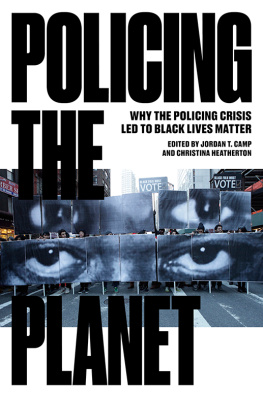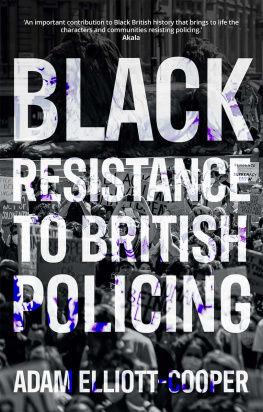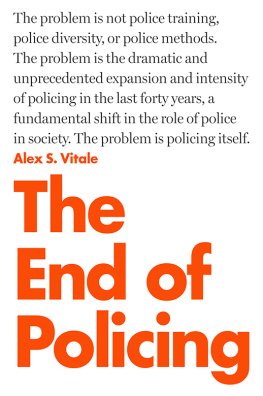POLICING THE PLANET
Why the Policing Crisis Led to Black Lives Matter
Edited by
Jordan T. Camp
and
Christina Heatherton

First published by Verso 2016
The collection Verso 2016
The contributions The contributors 2016
All rights reserved
The moral rights of the authors have been asserted
1 3 5 7 9 10 8 6 4 2
Verso
UK: 6 Meard Street, London W1F 0EG
US: 20 Jay Street, Suite 1010, Brooklyn, NY 11201
versobooks.com
Verso is the imprint of New Left Books
ISBN-13: 978-1-78478-316-7
ISBN-13: 978-1-78478-317-4 (US EBK)
ISBN-13: 978-1-78478-318-1 (UK EBK)
British Library Cataloguing in Publication Data
A catalogue record for this book is available from the British Library
Library of Congress Cataloging-in-Publication Data
Names: Camp, Jordan T., 1979- editor. | Heatherton, Christina, editor.
Title: Policing the planet : why the policing crisis led to black lives matter / edited by Jordan T. Camp, Christina Heatherton.
Description: New York : Verso, 2016.
Identifiers: LCCN 2016007516 | ISBN 9781784783167 (paperback)
Subjects: LCSH: Police brutalityUnited States. | Discrimination in law enforcementUnited States. | PoliceComplaints againstUnited States. | Police-community relationsUnited States. | BISAC: SOCIAL SCIENCE / Sociology / Urban. | LAW / Civil Rights. | POLITICAL SCIENCE / Political Freedom & Security / Civil Rights.
Classification: LCC HV8141 .P5977 2016 | DDC 363.2/30973dc23
LC record available at http://lccn.loc.gov/2016007516
Typeset in Garamond Prop by MJ & N Gavan, Truro, Cornwall, UK
Printed in the US by Maple Press
Contents
Not songs of loyalty alone are these,
But songs of insurrection also,
For I am the sworn poet of every dauntless
rebel the world over.
Walt Whitman
I see the dark-skinned bodies falling in the street as their ancestors fell before the whip and steel, the last blood pooling, the last breath spitting. I see the immigrant street vendor flashing his wallet to the cops, shot so many times there are bullet holes in the soles of his feet. I see the deaf woodcarver and his pocketknife, crossing the street in front of a cop who yells, then fires. I see the drug raid, the wrong door kicked in, the ministers heart seizing up. I see the man hawking a fistful of cigarettes, the cops chokehold that makes his wheezing lungs stop wheezing forever. I am in the crowd, at the window, kneeling beside the body left on the asphalt for hours, covered in a sheet.
I see the suicides: the conga player handcuffed for drumming on the subway, hanged in the jail cell with his hands cuffed behind him; the suspect leaking blood from his chest in the backseat of the squad car; the 300-pound boy said to stampede bare-handed into the bullets drilling his forehead.
I see the coroner nodding, the words he types in his report burrowing into the skin like more bullets. I see the government investigations stacking, words buzzing on the page, then suffocated as bees suffocate in a jar. I see the next Black man, fleeing as the fugitive slave once fled the slave-catcher, shot in the back for a broken tail light. I see the cop handcuff the corpse.
I see the rebels marching, hands upraised before the riot squads, faces in bandannas against the tear gas, and I walk beside them unseen. I see the poets, who will write the songs of insurrection generations unborn will read or hear a century from now, words that make them wonder how we could have lived or died this way, how the descendants of slaves still fled and the descendants of slave-catchers still shot them, how we awoke every morning without the blood of the dead sweating from every pore.
Martn Espada
I
E ric Garner lived on the brink of uncertainty. His death at the hands of New York City police officers in 2014 followed years of incessant harassment for small-scale infractions, including the sale of untaxed loose cigarettes. Garner was regularly stopped and searched, andas his 2007 civil rights lawsuit detailedhumiliated and sexually violated by police in public. Before he was slain on a Staten Island sidewalk, he pleaded with approaching officers, Every time you see me you arrest me. Im tired of it. It stops today. Garners murder, filmed on a phone by his friend Ramsey Orta, was viewed millions of times by people around the world. Garners final desperate words to the officers choking him, I cant breathe, became a rallying cry for organizers and activists fighting to end police violence and impunity. Similarly, his plea, This stops today was transformed into a demand to end the prosaic surveillance, arbitrary harassment, and intimate violationsthe daily life of policingthat led to Garners fatal assault. Protesters not only questioned how Eric Garner died; they also challenged the conditions under which he was forced to live.
Eric Garners name has joined a morbidly expanding roll call of the racialized poor killed by police and vigilante violence. Demonstrators have refused to let these premature deaths be explained away as mere excess or accident. They instead cast this violence as routinized and widespread. In so doing, they have called attention to the underlying material conditions that have preceded and ultimately enabled these killings. Rather than asking how the police can kill less, they have forced a broader set of questions: Why have the police been endowed with the arbitrary capacity to regulate the lives of the racialized poor in US cities? Why do they have expanding and unfettered access to the bodies of poor people in general and poor people of color routinely? How and why are poor people criminalized for occupying public space? Can the problem of police violence actually be solved with the addition of more police (even better trained, more diverse, or better monitored) as many police departments and federal proposals suggest? How have these issues been addressed in other global contexts? And finally, what alternate definitions of security might we imagine?
This book, Policing the Planet, is a collaborative effort between social movement organizers, scholar-activists, journalists, and artists to address these questions. Following the lead of social movements, it reassesses the policing philosophy known as broken windows theory. Praised as a comprehensive model of community policing, this doctrine has vastly broadened the capacities of police both nationally and globally. Through essays and interviews, the book explores the rise and spread of broken windows policing. In analyzing vengeful policing campaigns waged against the racialized poor, Native people, immigrant workers, Black and Brown youth, LGBTQI and gender-nonconforming people, the homeless, sex workers, and others, it demonstrates that broken windows policing emerged as an ideological and political project. In examining its spread throughout the United States and around the world, it explores how broken windows policing has become the political expression of neoliberalism at the urban scale. Racism, it argues, has sustained and naturalized these processes as inexorable and inevitable. The book therefore considers the struggle against racism, militarism, and capitalthe policing of the planetas a central political challenge of our times.









